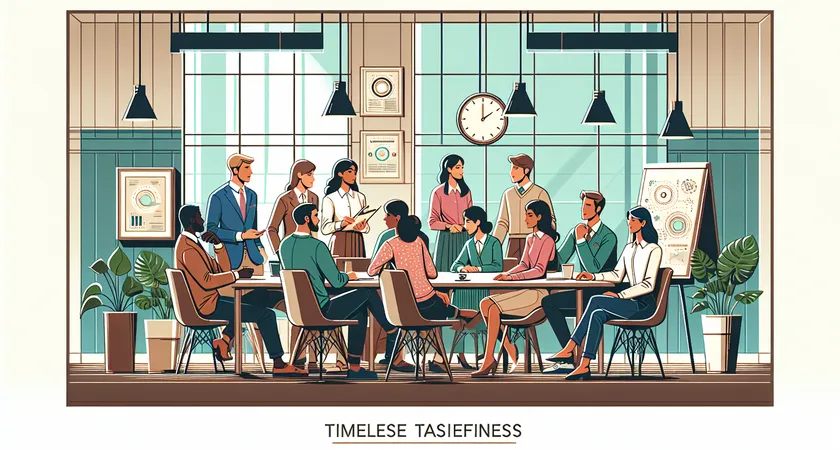In today's dynamic digital landscape, optimizing for search engines is both an art and a science. There’s no denying the immense impact structured data can have on your website’s visibility and performance. Among the most powerful strategies lies an advanced approach: maximizing SEO with JSON-LD FAQ blocks. This technique helps websites surface rich results, directly addressing user questions and boosting overall engagement. With frequently updated algorithms and smart searches, integrating techniques like JSON-LD FAQ schema has become pivotal for staying ahead in the rankings. But what does this mean for your content, and why is it so transformative for SEO optimization?
In this article, you’ll explore the ins and outs of JSON-LD FAQ blocks, discover their technical and strategic advantages, and gain actionable insights to elevate your search visibility. As we journey from information to actionable business value, you’ll see just how vital the right expertise is for sustainable success in SEO.
Ready to unlock the next level of optimization? Let’s dive in.
Understanding JSON-LD and FAQ Schema
Before diving into the implementation or business implications, it’s crucial to establish a clear understanding of JSON-LD and how FAQ Schema fits into the modern SEO landscape. This foundation will empower you to leverage these advanced tools effectively and see measurable results.
What Is JSON-LD? An Accessible Explainer
JSON-LD, or JavaScript Object Notation for Linked Data, is a lightweight format used to encode linked data using JSON. Loved by developers and marketers alike, it allows you to add structured information to your web pages for the benefit of search engines. Google, Bing, and other major engines increasingly rely on such structured data to understand your site content and provide richer search experiences.
- Clear communication: JSON-LD transmits information unequivocally to search bots.
- Non-intrusive: You can add JSON-LD scripts to your HTML pages without impacting user experience.
- Versatile: Supports multiple schema types, from products and reviews to events and FAQs.
This approach contrasts with traditional microdata or RDFa, offering both simplicity and scalability.

FAQ Schema: Bridging Questions and Search Results
FAQ schema is a specific subset of structured data that helps search engines identify frequently asked questions and their answers. When implemented correctly, this schema can make your questions and answers eligible for enhanced search features, such as FAQ-rich results displayed directly in the SERP (Search Engine Results Page).
- FAQ blocks can increase click-through rates by providing immediate value in the search snippet.
- They help address user intent more precisely, reducing pogo-sticking behavior.
- Implementing FAQ schema can differentiate your listings and boost authority in your niche.
According to a 2022 Search Engine Journal report, sites with properly marked-up FAQ schema can see a CTR boost of up to 30% on targeted keywords.

JSON-LD vs. Other Schema Formats
While other structured data formats like Microdata or RDFa also serve to mark up content, JSON-LD offers several advantages:
- Modularity: Easily add, remove, or update information without disrupting the main HTML structure.
- Performance: Reduces parsing complexity for search engines, leading to faster indexing.
- Simplicity: JSON-LD scripts are easier to troubleshoot and modify, particularly on dynamic websites.
For business owners and SEO practitioners, these benefits translate into faster rollouts and improved flexibility for rapid updates.
Understanding these foundational elements sets the stage for their application to real-world SEO strategies, which we’ll cover in depth in the following sections.
How JSON-LD FAQ Blocks Supercharge SEO Performance
Diving deeper, it's crucial to recognize how JSON-LD FAQ blocks directly influence your site’s search performance. These benefits are both technical and strategic, impacting rankings, usability, and long-term visibility.
Unlocking Rich Results: Standing Out in the SERP
One of the most visible advantages of using JSON-LD FAQ schema is eligibility for FAQ-rich results. These are specialized search snippets that display your site’s most relevant FAQs directly below your main result. For users, this provides instant answers. For site owners, it means dominating more real estate on the results page.
- FAQ-rich snippets visually expand your listing’s footprint.
- They make answers directly available, which boosts perceived authority and trust.
- According to Backlinko (2023), sites with structured FAQ blocks were 2.5 times more likely to appear for voice searches.
Let’s imagine a user searching for "How to automate content workflows with a headless CMS"—if your page uses JSON-LD FAQ blocks, Google may show your precise Q&A, increasing both impressions and clicks.

Enhancing User Engagement and Dwell Time
Modern SEO is about more than just ranking; it’s about user experience. JSON-LD FAQ sections serve this dual purpose by:
- Anticipating and answering user queries before they leave your site.
- Providing a logical, navigable structure to site content.
- Encouraging users to explore related topics, reducing bounce rates.
For instance, an e-commerce site can reduce customer support tickets (and enhance their SEO) by surfacing policy answers right in their FAQ schema. This not only pleases search engines but genuinely helps site visitors.

Improving Keyword Coverage and Semantic Relevance
Optimizing for questions and answers naturally encourages broader keyword use and contextually rich content. JSON-LD FAQ blocks allow you to capture long-tail and conversational search phrases, critical for modern SEO strategies.
- Each question/answer pair targets a niche query, accumulating valuable semantic signals.
- This approach aligns with Google’s shift toward intent-based and conversational search.
- You can proactively capture phrases surfaced via tools like Answer The Public, SEMrush, or Google Search Console.
As a result, your pages end up ranking for a wider variety of related queries—driving consistent, high-intent organic traffic.
Best Practices for Implementing JSON-LD FAQ Schema
Knowing the advantages is just the start. To maximize SEO with JSON-LD FAQ blocks, implementation must be accurate, scalable, and compliant with search engine guidelines. Missteps can result in lost opportunities or even manual penalties from search engines.
Crafting Quality FAQ Content That Delivers Value
The core of any effective FAQ block is *relevance* and *accuracy*. Craft your questions from actual user queries and be concise, factual, and helpful in your answers.
- Use natural language: Favor conversational phrases over technical jargon unless necessary.
- Prioritize search intent: Each question should directly mirror your ideal user's curiosities.
- Avoid fluff: Keep answers clear, correct, and actionable.
For example, rather than “What does JSON-LD do?” aim for “How does JSON-LD help my website rank higher?” This subtle switch provides more value and satisfies user intent.

Technical Steps for Adding JSON-LD FAQ Blocks
Technically implementing JSON-LD FAQ schema involves embedding a specific script in your page’s HTML. The markup follows a predictable pattern defined by Schema.org and validated by Google’s testing tools.
- Create a script tag with type="application/ld+json".
- Define an object using the "FAQPage" schema type.
- List each question/answer as a separate object in an array.
Here’s an example for context:
{ "@context": "https://schema.org", "@type": "FAQPage", "mainEntity": [{ "@type": "Question", "name": "What is JSON-LD?", "acceptedAnswer": { "@type": "Answer", "text": "JSON-LD is a format for encoding linked data." } }] }- Validate your markup with Google’s Rich Results Test or Schema Markup Validator.
- Regularly audit your schema as you update content.
Remember: Incorrect implementation can prevent FAQ-rich results from appearing, so regular tests are essential.
Avoiding Common SEO and Schema Pitfalls
While FAQ schema is powerful, using it incorrectly can cause issues—including penalties or rich result ineligibility. Always adhere to these best practices:
- Don’t duplicate: Each question should be unique within your site.
- Never mark up irrelevant or promotional content as FAQ. Google may reject or suppress questionable entries.
- Keep it updated: Out-of-date answers weaken trust and can negatively impact SEO.
Case studies have shown that sites with regularly refreshed, helpful FAQ content see sustained gains in both SERP visibility and on-site engagement.
Advanced Strategies and Commercial Benefits of FAQ Schema Integration
With the fundamentals covered, it’s time to explore the advanced strategies and business benefits of using JSON-LD FAQ blocks—especially as part of a comprehensive SEO optimization or content automation strategy.
Integrating FAQ Blocks with Headless CMS and API Workflows
Modern web architectures—like headless CMS and API integration—allow for seamless, programmatic management of your FAQ content across hundreds or even thousands of pages. By coupling JSON-LD FAQ schema with these systems, you can:
- Automate content updates, ensuring your questions and answers remain current and accurate at scale.
- Leverage APIs to adapt FAQ responses to user behavior or changing trends.
- Rapidly expand or customize FAQs for specific verticals, locales, or product lines.
For example, large SaaS platforms use proprietary CMS pipelines to update FAQ schema in real-time, keeping pace with feature changes and user feedback.

Measuring the ROI of Rich Results and User Engagement
From a business perspective, the ability to monitor and maximize the return on investment (ROI) from JSON-LD FAQ integration is key.
- Track click-through improvements from enhanced snippets using Google Search Console.
- Analyze engagement metrics and time-on-page via analytics platforms (e.g., GA4, Matomo).
- Correlate support ticket reductions or conversion uplifts with new or updated FAQ segments.
Consider this: A 2023 study by Moz found that sites leveraging structured FAQ schema experienced a 120% increase in organic question-driven traffic over six months compared to those without such markup.
Positioning for Voice Search and Conversational AI
FAQ structured data is a powerful ally in the era of voice search and AI-powered assistants. Clear question/answer pairs are primed for extraction by smart devices, aligning your brand with tomorrow’s search habits. Effective use lets you own critical zero-click answers and shape conversational search narratives.
- Amazon Alexa, Google Assistant, and Siri increasingly use FAQ markup to source voice answers.
- Owning these search touch-points can influence every stage of the buyer journey.
The case for advanced schema is crystal-clear: it’s not just about SEO, but overall digital positioning and future-proofing your online presence.
Challenges, Considerations, and the Value of Expert Support
While JSON-LD FAQ schema offers proven benefits, its successful implementation comes with challenges—technical, operational, and strategic. Recognizing when to seek expert support can make all the difference between marginal gains and transformative results.
Staying Compliant with Search Engine Guidelines
Google and other engines frequently update their guidance regarding structured data. Failing to keep up can result in reduced coverage or even loss of rich results.
- Schema misuse—such as marking up hidden or commercial content—can result in penalties or manual actions.
- Keeping multiple pages compliant across a large site is resource-intensive.
Strong technical oversight is vital to maintaining compliance without sacrificing innovation.
Scaling Schema Across Complex Sites
For brands operating at scale—think e-commerce, SaaS, or multi-language publishers—integrating and maintaining FAQ structured data can be daunting.
- Versioning and QA are complex, especially alongside regular site updates and content changes.
- Localization and translation introduce further challenges for global brands.
Automating these processes via a content automation engine or expert partner, such as Beatrice, ensures you remain agile and accurate as you scale.
Why Professional Support Makes a Difference
When the difference between success and stagnation comes down to technical perfection and strategic foresight, professional support is irreplaceable.
- Experts stay abreast of best practices, algorithm updates, and shifting schema guidance.
- They implement robust QA processes, reducing the risk of code or compliance errors.
- Strategic partners bring holistic insights—blending content, UX, and business needs.
Wouldn’t you rather leverage proven expertise than risk costly missteps or missed opportunities?
Conclusion: Future-Proof Your SEO with Smart Schema and a Trusted Partner
The digital world is evolving at breakneck speed, and SEO best practices are no exception. Maximizing SEO with JSON-LD FAQ blocks is no longer a ‘nice to have’—it’s a necessity for brands serious about visibility, engagement, and sustainable long-term growth. By embracing structured data, you position your content to rise above the noise, capture more qualified traffic, and directly support user journeys from search to solution.
But as we've explored, technical complexity, constant algorithm shifts, and the demands of scale mean that high-quality implementation is rarely a solo effort. Partnering with experts in SEO optimization, content automation, and modern content infrastructure ensures you not only maximize today’s opportunities, but also adapt smoothly to future innovations.
Are you ready to unlock new levels of SEO performance—and future proof your business? Let an experienced provider like Beatrice guide your content strategy, enhance your technical stack, and empower you to automate high-impact SEO articles that dominate the SERP. Stay ahead, stay optimized, and see the results for yourself.
